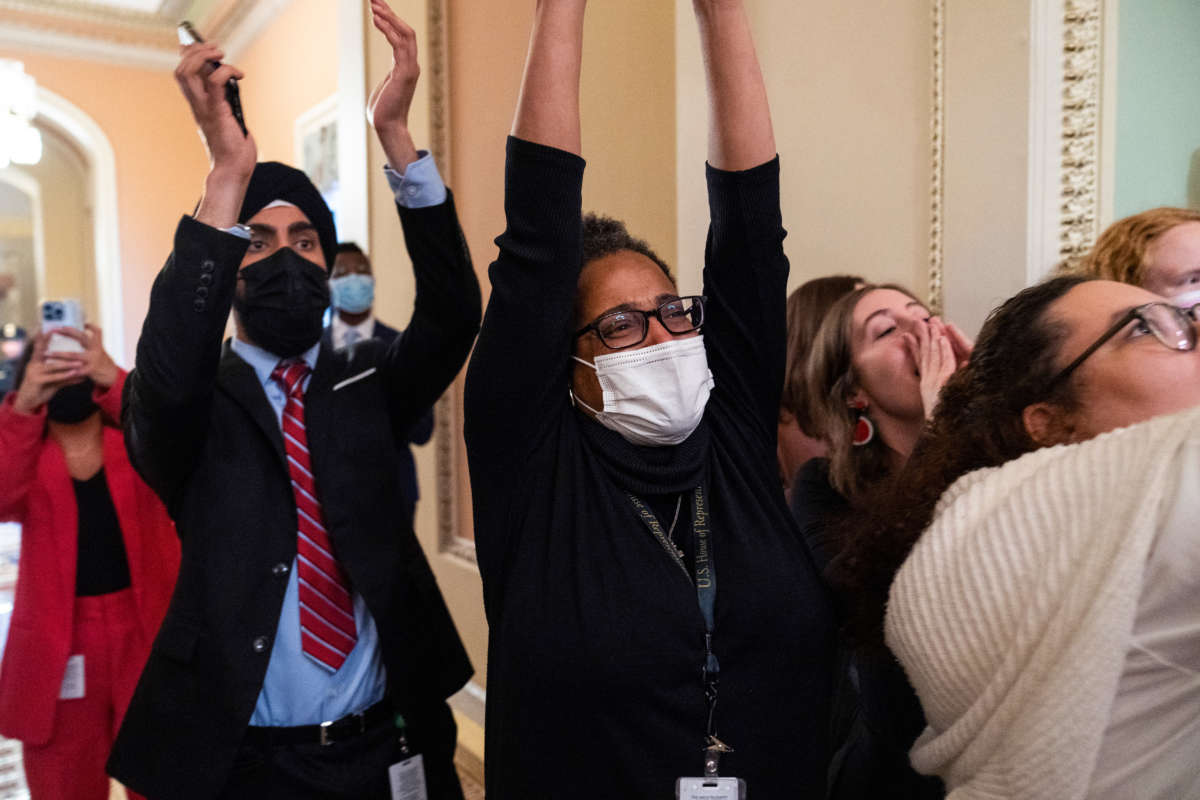The House voted on Tuesday night to allow its staffers to form unions, a major win for congressional staffers who have been organizing for over a year in order to gain power over what they say are often abusive working conditions.
The resolution, introduced by Rep. Jamie Raskin (D-Maryland), passed along with a slate of other measures in a party line vote of 217 to 202. Since the resolution doesn’t need the approval of the Senate to go into effect, House staffers will now be allowed to file petitions to form unions on an office-by-office basis.
The Congressional Workers Union celebrated the win as “a historic moment.” “Tonight is a reminder of the power of collective action and what the freedom to form a union truly means – democracy not just in our elections, but in our workplaces too,” the union said in a statement. “To our fellow congressional workers: today belongs to us. Tomorrow, we continue the fight – solidarity forever and onwards!”
Congressional staffers wishing to unionize can now go through a similar process to that of unionizing workers across the country, with legal protections against retaliation that they didn’t have before. Thirty percent of staffers in an office can file a petition for a union election with the Office of Congressional Workplace Rights in order to go through an election.
The union will allow the workers to negotiate provisions like promotions and working conditions – but workers are limited by congressional rules in their ability to negotiate things like health care and retirement benefits. Staffers, especially those who are nonwhite, say that they face long hours and abusive bosses in Congress with no accountability while having little to no opportunity for recourse.
Crucially, workers will also be able to negotiate wages, which staffers hope will help to combat “brain drain” from Congress and open the door for people from poor and nonwhite backgrounds to be able to take jobs in Congress. There are still limits on wage raises, however, as members of congress get a certain allowance for their office each year – an allowance that members have said before is inadequate to pay their workers better wages.
Last week, Speaker Nancy Pelosi (D-California) announced that the House would, for the first time, establish a minimum pay rate for congressional staffers. While the new minimum annual pay of $45,000 will likely be a raise for many workers, it is certainly not a living wage for a single adult without children in Washington, D.C. according to the Massachusetts Institute of Technology living wage calculator.
In a speech on the House floor ahead of the vote, Levin emphasized that passing his resolution would help congressional workers to access the same protections under labor laws as other workers across the country. “The power of workers to unite and demand fair wages, better benefits and safer working conditions was central to the creation of the American middle class, and it’s central right now for working families simply trying to get by,” Levin said in a speech on the House floor ahead of the vote.
“For months now, our workers have been organizing in the shadows because they lack the legal protections to come forward,” he continued. “The least we can do is honor and respect their effort to organize in Congress, giving them the long overdue right to find their collective voice.”
While Republicans didn’t speak against the measure on the House floor, not a single GOP member voted to pass it. Daniel Schuman, policy director for Demand Progress, argues that Republicans have still been waging anti-worker campaigns, however, by delegitimizing government work in part to keep staffer salaries low, the New York Times reports.
Join us in defending the truth before it’s too late
The future of independent journalism is uncertain, and the consequences of losing it are too grave to ignore. To ensure Truthout remains safe, strong, and free, we need to raise $46,000 in the next 7 days. Every dollar raised goes directly toward the costs of producing news you can trust.
Please give what you can — because by supporting us with a tax-deductible donation, you’re not just preserving a source of news, you’re helping to safeguard what’s left of our democracy.
